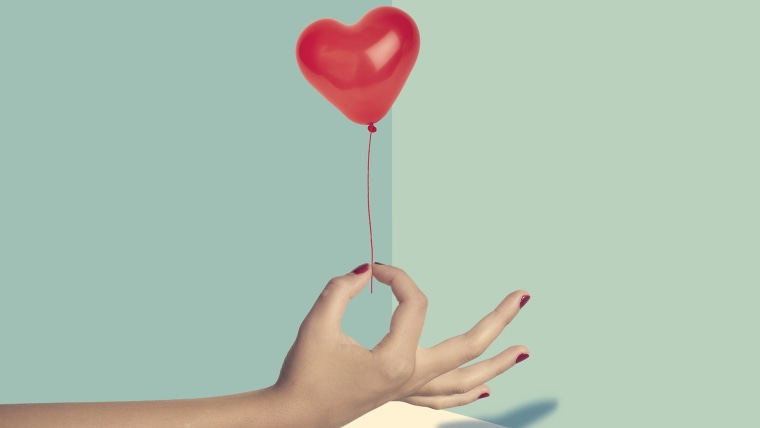Netflix’s new reality TV show “Love Is Blind” (the finale of which began streaming Thursday) bravely posited the age-old question: “What if people who are good-looking in a socially agreed-upon way also had trouble finding love, mostly because they were prejudged for being too hot?”
The solution, naturally, was to see whether these totally unique specimens could form purely emotional and not-at-all Stockholm syndrome-esque connections by speed-dating through a wall while Vanessa and Nick Lachey hosted.
The trials and tribulations of finding love — or at least a decent human with whom to enjoy meals and sex on a regular basis — has been a major topic of art and conversation since Ötzi the Iceman was sliding into people’s wall etchings. But is it really possible to fall in love without ever seeing each other in the flesh?
Get the think newsletter.
When everyone is reasonably hot and seems primed to find their “forever person” from the jump, the answer seems to be … yes, maybe — depending on how you define “love.” Love and lust will always hinge on the ineffable chemistry that happens IRL, as “Love Is Blind” sometimes painfully illustrates.
The sight-unseen bonding ritual of the pod people on the show reminded me of talking to my teen crush on the phone in the middle of the night or the interminable hours I spent on IRC and Usenet in the ’90s, catching feelings for other spooky insomniacs. But the difference is that I didn’t end up marrying any of them — and we met in those ways because we were weirdos looking for acceptance and understanding in a world that seemed awfully unfriendly to weirdos, not because we were too hot to be loved for our minds.
Years later as an intern, I beta-tested Nerve’s then-faceless online personals, which ended up becoming a juggernaut that made meeting people online hip instead of weird. Now online dating, driven by a photos-first app culture, is the default, and there’s always someone better (or at least more promising or just newer) one swipe away.
So I get the allure of seeing couples forced to decide on someone based on something seemingly more fundamental than looks. It’s useful and healthy to interrogate why we’re attracted to the people we’re attracted to or why we assume certain people would make great partners for us, whether it’s based on height and weight or age and education. For example, is it internalized sexism when women favor taller men? Absolutely! Does knowing that stop anyone? Not often enough.
Take one of the more unstable couples on the show, Jessica and Mark — one of the six couples who formed the backbone of the show’s 10-episode arc, although creator Chris Coelen told People that even more couples got engaged off-screen and that entire relationships were edited out. In quick succession, they declared their love, proposed, met face to face and were off to the marriage races. (It still isn’t clear whether the carrot of meeting each other in the flesh required said proposal.)
One of the main sticking points between them seemed to be his age — he’s 24; she’s 34 — and his height, which, assuming she’s wearing heels in this picture, is still taller than hers. It’s safe to assume that they might not have made it through each other’s age/height filters if they’d been using a dating app or site, but I’m not sure whether that’s good or bad. (Mark doesn’t seem to regret the experience.) But they did decide to sit in separate rooms during a date at the apartment they occasionally shared so they could speak freely to each other, because it was easier to be “in love” when the baggage about whom they were “supposed” to be in love with wasn’t in the room with them.
Or take the headline-making blowup between Carlton and Diamond after he told her he’d had relationships with men. On the one hand, the pod time was billed as a no-hold-barred, bare-your-soul-to-meet-your-soulmate experience; on the other, Carlton opted to hold back, concerned about how that aspect of his past might be received.
The situation could have been avoided — and, of course, the made-for-TV drama eliminated — with some gentle insight from a queer-positive therapist, who likely would have suggested discussing the matter while they were still in the pods instead of post-engagement at a resort in Mexico and in a matter-of-fact way to defuse feelings of defensiveness, fear and confusion and to allow for a more gracious rejection, if it needed to happen at all.
Would it be helpful if the producers offered any off-screen guidance or, like, therapy for the couples? Emphatically, yes. Like anyone who developed crushes in chatrooms or on internet dates after long bouts of texting knows, just because you’re talking doesn’t mean you’re being truly revealing.
And would “Love Is Blind” have been a more interesting experiment if they had cast people who were actually not just thin, able-bodied and cisgender? Hell, yeah. Would America really want to watch people who look like us try to find love (with mixed results) in all of our lumpy, aging, fleshy glory? I’d sure like to find out.












